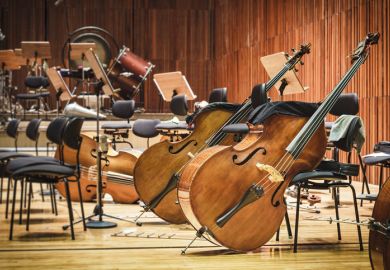Janet Ritterman enjoys an elegant and slightly 'out-of-time' biography
Lewis Lockwood, one of the most distinguished of contemporary Beethoven scholars, has marked his recent retirement from the music department at Harvard University with the publication of a masterly study of the life and music of Beethoven. While also known for his contribution to Renaissance studies, it is with the music of Beethoven that Lockwood has been most strongly associated. During the past 30 years or so, he has produced a steady stream of articles on aspects of the composer's work, many of which have played a key part in shaping the ways in which his repertoire is now perceived and understood. In 1992, some of these articles were reissued in a volume entitled Beethoven: Studies in the Creative Process . This, however, is Lockwood's first full-length publication dealing with Beethhoven's musical output. As such it has been long awaited, and will be widely welcomed.
As the author's opening remarks make clear, the focus evident in his previous work is maintained here. This is unashamedly a study of a traditional kind - a study of the life and works, emphasising the works rather than the life. Nevertheless ample attention is given to the life, career and milieu relating this to musical and compositional development, rather than to detail of the kind that the author would regard as extraneous. Lockwood describes his approach as modelled on recent biographies of Einstein and Goethe, and aims to give readers "access to Beethoven's works both as reflections of outer influences and as imaginative products of a richly endowed musical mind". The challenges that all scholars face when attempting this type of interweaving are discussed at various points in the book.
An iconic figure in so many ways, Beethoven proved a lure for 19th and 20th-century biographers. This trend shows no sign of abating: the 1990s saw a steady stream of publications devoted to Beethoven by British and US authors. In the past three years there has been a Cambridge Companion to Beethoven , edited by Glenn Stanley, and a volume in the Master Musicians series. While all of these reflect some of the traditional emphases that have characterised Beethoven studies, several - by adopting different patterns of organisation or different perspectives - embrace some of the developments in music theory and musicology that have characterised the past decade or so. The multi-authored Cambridge Companion , for example gives prominence to the reception of Beethoven's music and to issues of genre, style and structure. However, like most other publications on Beethoven in the past 25 years, it cannot but reflect the influence of Lockwood's scholarship.
Against this already-crowded field, how does Lockwood's latest publication measure up? While there is no doubt of its authority and significance, there is something of an "out-of-time" feeling that permeates the volume.
The typeface, layout and chapter titles seem more attuned to the 1960s or 1970s than to the 1990s or now. And although Lockwood does not ignore recent trends in Beethoven scholarship, the book, rich though it is in detail and in the perceptiveness of observations, does not position itself as strongly as it might in the vanguard of Beethoven studies.
Like the Cambridge Companion , Lockwood's book is organised into four main sections. However, they follow the traditional chronological sequence: the first part, devoted to Beethoven's early years, is followed by three sections, dealing in turn with the "first maturity" (1792-1802), the "second maturity" (to 1812) and the "final maturity" (to 18). Each of the four parts contains an opening chapter or two that sets the scene and describes the context within which Beethoven was working. Subsequent chapters focus on music characteristic of the particular stage of the composer's career.
The volume opens with an imaginatively conceived prologue, poetic in its handling, subtle in its observations. It is based on three of Beethoven's letters from different periods - one from 1787, when the 16-year-old lost his mother, is an apology to a recent acquaintance; a second, from 1812, is a touching acknowledgement from the established composer to an unknown child admirer; and the third, from 1826, a few months before his death, is an emotional response to a childhood friend. Sensitively contextualised, each letter serves to set the scene for the material that follows, where the emphasis is more consistently on the music than on the emotional and spiritual development of the man.
Lockwood confesses to having felt, in writing this book, the "generalist yearning to get out". It is therefore aimed at the general reader and described as a "broad survey" - a "précis of many specialised monographs, many already written and some still unwritten". How successful this approach has proved to be is a moot point. The main concession to the general reader - the means by which Lockwood aims to "make the discussion of Beethoven's works as accessible as possible" - appears to be the location of most of the musical examples (a further 69 in total) on the publisher's website ( www.wwnorton.com/trade/lockwood ). While the availability of these may ease the lives of student essay-writers, it is difficult to believe that this resource will be frequently used by other readers, or that it is sufficient to render the text more accessible. The accounts of individual works, while perceptive in the analogies made and comparisons drawn, are still likely to deter many of those who would consider themselves general readers. Most chapters on the music assume more than a passing acquaintance with music theory and analysis. The illustrations, however, which are generously interspersed within the text, are well chosen and enliven the book.
With a composer such as Beethoven, even a volume of more than 600 pages scarcely allows space for discussion of all the works that readers may expect to find treated in some detail. Lockwood's approach to the choice of works for his "broad survey", and the relative attention given to those selected, is therefore likely to arouse some disappointment among musical readers. It is the late works that receive most attention; earlier works are generally passed over quite briefly. With the piano sonatas, for example, the 11 works from the Pathétique to Opus 31, though characterised as "a Laboratory of Invention", are treated in ten pages. Other major areas of the repertoire receive similar treatment. However, were it only for the discussion of works such as the Missa solemnis , the Ninth Symphony and the late quartets, Lockwood's biography is worth reading - and taken as a whole, the book offers much more than this. Lockwood writes elegantly: the prose is a model of lucidity and reveals that compelling combination of scholarly depth and musical sensibility. The benefits of a lifetime's study of the music through scholarship and performance have rarely been more tellingly demonstrated.
Whether "cutting-edge" musicology or not, this biography is likely to be the volume to which many readers turn for insights into a corpus of works that continues to hold a central place in our understanding of western music and western culture.
Dame Janet Ritterman is director, Royal College of Music.
Beethoven: The Music and the Life
Author - Lewis Lockwood
ISBN - 0 393 05081 5
Publisher - Norton
Price - £28.00
Pages - 604
Register to continue
Why register?
- Registration is free and only takes a moment
- Once registered, you can read 3 articles a month
- Sign up for our newsletter
Subscribe
Or subscribe for unlimited access to:
- Unlimited access to news, views, insights & reviews
- Digital editions
- Digital access to THE’s university and college rankings analysis
Already registered or a current subscriber?



